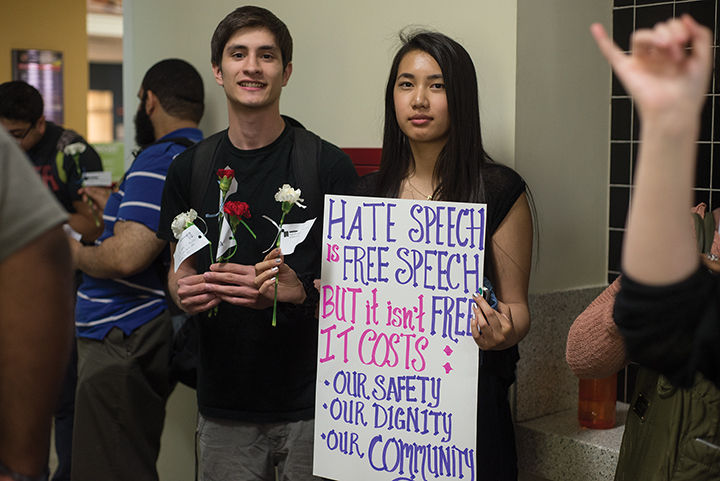
Yaser Valiuddin, sophomore information systems major, and Tam-Ahn Nguyen, a sophomore communication and film major, stand outside of Hoff Theater holding signs and roses that discourage hate speech.
The student first in line for College Republican’s screening of American Sniper at Hoff Theater had two finals to study for, homework due at midnight and a car to fix.
Yet for Jason Musick, a junior mechanical engineering major and a veteran who served in the Marine Corps for more than five years as a mechanic, the screening was too important to miss. While he hadn’t seen the movie before, he said he wanted to see it because he believes no one should infringe on others’ choice to see a movie.
“I have my own reservations about seeing this movie just because of my own personal issues I’ve experienced with the conflict,” said Musick, who was deployed to Iraq in 2002 from Kuwait. “But at the same time, the controversy behind this situation is what drove me to see this.”
Musick and about 275 other students attended the free screening at Hoff Theater. After the screening, a panel discussion hosted by the College Republicans and the College Democrats discussed the legal, cultural and ethical perspectives in the film.
On April 28, College Republicans announced it would host a screening of the 2014 movie and a panel discussion after Student Entertainment Events postponed its screenings of the film in response to student criticism.
After SEE canceled the event April 22, social media users berated the Muslim Students Association for its role in the screening’s cancellation, eventually prompting the organization to temporarily take down its Facebook page due to abusive and hateful comments.
Before the screening, students from various student groups, including the MSA, UMD Feminists, Students for Justice in Palestine and Asian American Student Union, handed out flowers in support of the MSA. Each flower featured a note with a hateful message MSA received, as well as a response from an MSA member.
One note attached to a white flower read, “The only bigot here is you and your kind. NO Sharia Law in America GTFO,” with a response of, “Hello! My name is Yaser and Islam has taught me to greet all others with peace.”
Shani Banks, MSA vice president, said the group wanted to share its story with the public in a pleasant manner.
“The primary goal of this was to come out and tell our narrative,” said Banks, a senior psychology major. “Not many people know where the Muslim Student Association lies on the issue.”
UMD Feminists members, including Jill Santos, the group’s president, also supported the MSA by handing out flowers.
“We’re here because we hate that a lot of the Muslim students on our campus received personal death threats,” said Santos, a senior criminology and criminal justice and psychology major. “Threats of violence to specific events they were planning was disgusting, and that’s not tolerated on our campus.”
About 100 students attended the hourlong panel discussion following the screening. The panelists discussed their reactions to the film, the film’s strengths and weaknesses and the larger context that surrounds American Sniper.
Dawud Walid, executive director of Michigan’s Council on American-Islamic Relations chapter and a U.S. Navy veteran, led the panel by criticizing the film for its inaccuracies and problematic framing.
“I viewed much of the framework to be extremely problematic, coming from the perspective of American exceptionalism,” Walid said.
Michael Spivey, a government and politics professor, said the controversy surrounding the screening of the film was not about the First Amendment.
“There was no attempt by any governmental entity to restrict speech, so there was no First Amendment issue with respect to that,” Spivey said.
Sarah Oates, a journalism professor, acknowledged and praised the MSA’s flower idea during the panel discussion.
“It’s just a fascinating and incredibly effective way of communicating,” Oates said.
While the panel touched on various issues, including the Baltimore riots, news coverage of war, nationalism and post-traumatic stress disorder, there was not much dialogue directly about MSA’s initial safety concerns with the film being shown.
Musick, who spent more than four hours at the event, said the discussion failed to achieve its main goals.
“If it was going to be an effective discussion, they should have argued the point of why they were trying not to play it,” Musick said, “and I think it failed there.”



